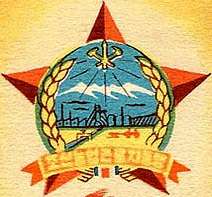Union of Agricultural Workers of Korea
 | |
| Abbreviation | UAWK |
|---|---|
| Predecessor | Farmers' Union of North Korea |
| Formation | January 31, 1946 |
| Type | Trade union and mass organization |
| Purpose | Agriculture |
| Headquarters | Pyongyang, North Korea |
Region | North Korea |
Membership (2014) | 1,6 million |
Chairman | Ri Myong-kil |
| Affiliations | Democratic Front for the Reunification of the Fatherland |
| Union of Agricultural Workers of Korea | |
| Chosŏn'gŭl | 조선농업근로자동맹 |
|---|---|
| Hancha | 朝鮮農業勤勞者同盟 |
| Revised Romanization | Joseon-nongeop-geulloja-dongmaeng |
| McCune–Reischauer | Chosŏn-nongŏp-kŭlloja-dongmaeng |
| Abbreviation | |
| Chosŏn'gŭl | 농근맹 |
| Hancha | 農勤盟 |
| Revised Romanization | Nonggeunmaeng |
| McCune–Reischauer | Nonggŭnmaeng |
The Union of Agricultural Workers of Korea (UAWK; or Korean Federation of Agricultural Workers[1]) is a trade union and mass organization for agricultural workers in North Korea.[2] It is one of the most important mass organizations in the country.[3] UAWK was founded in 1946 and reformed in 1965 along the lines of North Korean leader Kim Il-sung's landmark Theses on the Socialist Rural Question in Our Country. The organization is a member of the popular front Democratic Front for the Reunification of the Fatherland and is directly controlled by the Central Committee of the ruling Workers' Party of Korea.
UAWK educates its 1.6 million members - farmers as well as office workers and manual laborers in the farming sector - on agricultural issues. Additionally, the organization educates on ideological matters, including Juche. The current chairman is Ri Myong-kil.
History
The Union was founded as the Farmers' Union of North Korea on 31 January 1946.[4] In February 1951, it was combined with its South Korean equivalent, the General Federation of Farmers' Unions, to form the Farmers' Union of Korea. The organization adopted its current name in 25 March 1965. The reason behind the name change was a decision to renew the organization according to the guidelines set in Kim Il-sung's 1964 landmark work on agricultural policy, Theses on the Socialist Rural Question in Our Country.[5]
Organization
The organization is headquartered in the capital Pyongyang.[6] It is directly controlled by the Central Committee of the ruling Workers' Party of Korea.[7] UAWK is a member of the popular front Democratic Front for the Reunification of the Fatherland.[8]
The current chairman of UAWK is Ri Myong-kil.[9] His predecessor was Seong San-sop since April 1998. Seong, in turn, was preceded by Choe Seong-suk, who had been the chairman since 1993.[5]
Membership
The Union's current membership of 1.6 million is down from three million in the 1980s.[10][1]
North Korean citizens are required to be members of at least one party-affiliated mass organization, one of which is the UAWK. Membership in the UWAK is open to farmers on collective farms between the ages of 31 and 65 (60 for women),[10] as well as office workers, and manual laborers in the agricultural sector.[4]
In addition to educating about agricultural matters, the organization provides education on ideology,[10] including the Juche idea.[11] The role of the organization can be characterized as "indoctrinating and controlling ... rather than [representing] workers."[2]
See also
References
- 1 2 Scalapino & Kim 1983, p. 102.
- 1 2 Hassig, Ralph; Kongdan Oh (2015). The Hidden People of North Korea: Everyday Life in the Hermit Kingdom (2nd ed.). Lanham: Rowman & Littlefield Publishers. p. 63. ISBN 978-1-4422-3719-3.
- ↑ Scalapino & Kim 1983, p. 84.
- 1 2 Yonhap 2002, p. 389.
- 1 2 Yonhap 2002, p. 390.
- ↑ The Europa World Year: Kazakhstan – Zimbabwe. London: Europa Publications. 2004. p. 2486. ISBN 978-1-85743-255-8.
- ↑ "Country Reports on Human Rights Practices for 2015: Korea, Democratic People's Republic of". Bureau of Democracy, Human Rights and Labor; U.S. Department of State. Retrieved 8 January 2017.
- ↑ Lansford, Tom (2015). Political Handbook of the World 2015. Singapore: CQ Press. p. 3330. ISBN 978-1-4833-7155-9.
- ↑ "Workers' Organizations". North Korea Leadership Watch. Retrieved 6 January 2017.
- 1 2 3 Understanding North Korea 2014, p. 367.
- ↑ Cha, Victor (2012). The Impossible State: North Korea, Past and Future. London: The Bodley Head. p. 43. ISBN 978-1-4481-3958-3.
Works cited
- Scalapino, Robert A.; Kim, Chun-yŏp (1983). North Korea Today: Strategic and Domestic Issues. Institute of East Asian Studies, University of California, Berkeley, Center for Korean Studies. ISBN 978-0-912966-55-7.
- Understanding North Korea 2014 (PDF). Seoul: Institute for Unification Education. 2015. OCLC 829395170.
- Yonhap (2002). North Korea Handbook. Seoul: M.E. Sharpe. ISBN 978-0-7656-3523-5.
Further reading
- Kim Il-sung (1964). Theses on the Socialist Rural Question in Our Country. Pyongyang: Foreign Languages Publishing House. OCLC 150935485.
- — (1984). "On the Main Tasks of the Union of Agricultural Workers, February 16, 1972". Works (in Korean). Pyongyang: Workers' Party of Korea Publishing House.
- Kim Jong-un (2017). On Improving the Role of the UAWK in Accomplishing the Juche-oriented Socialist Cause (PDF). Pyongyang: Foreign Languages Publishing House.